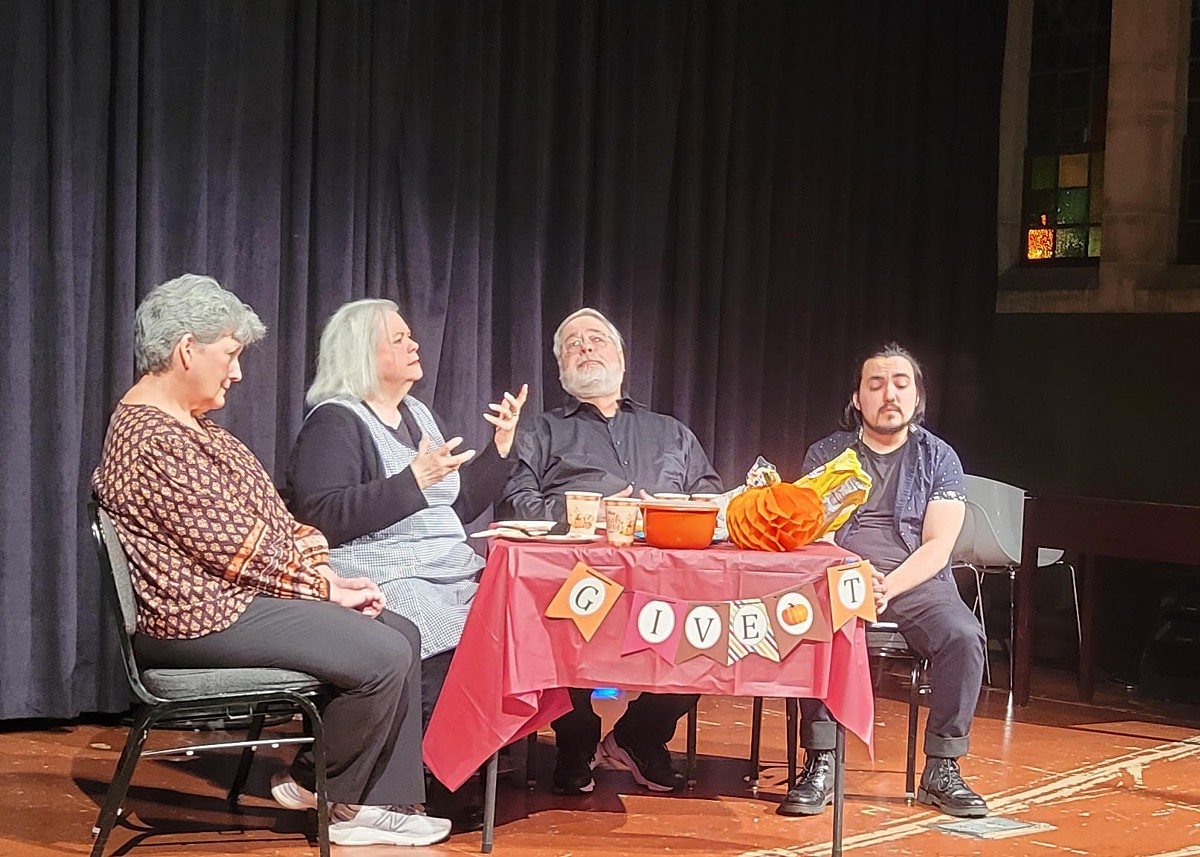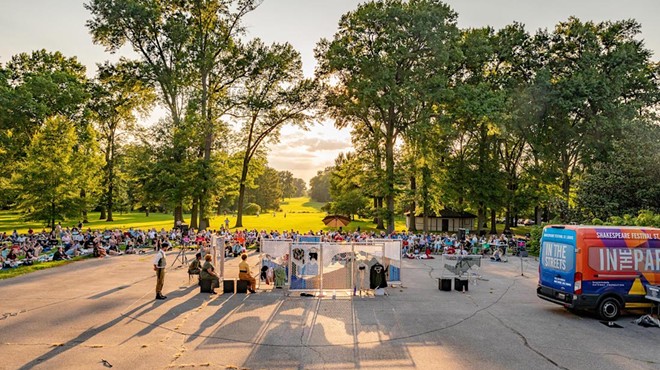Spectrum 2024 features seven new plays from six playwrights, directed by Melissa Balint Boyer and Rob Corbett and performed by an ensemble featuring Alex Alderson, Iris Clay, Ann Egenriether, Dorothy LaBounty, Justin Panacchia, Erica Perlow, Anna Rimar and Brad Slavik.
Your New Bob, by Eric Pfeffinger, opens with Julie, a school administrator, introducing Bob, a white, middle-aged man, to Colleen, a young Black accounting professor. Julie explains that Bob is here for Colleen to work and treat as she likes for the coming year. Colleen is taken aback and protests, though she soon finds herself alone with Bob. He’s woefully unskilled and keeps goading Colleen about whether she’s going to beat him or not. While there’s something to the topic, I found this short play tone deaf, unfunny and predictable.
Give Thanks, by Dan Zeliner, is another short that misses the mark by focusing on political and generational gaps. Maggie, a liberal from San Francisco, has come to visit her conservative sister Linda and her family for Thanksgiving. Linda brings out wonder bread and sliced meat for the meal, Maggie adds a quinoa salad, and the guys are more interested in getting this over with so they can go watch the game. Stereotypes and predictability abound as the family interacts and shares their inner thoughts. This play feels like a sketch we’ve seen done better somewhere else.
The evening takes a turn for the better with Va-Va-Vicarious, a play by Kim E. Ruyle that pulls back the curtain to show audiences the real people behind two successful franchises. Romance novelist Kitty Keen is busy working on her computer in a crowded airport bar when screenwriter Max Strong approaches and asks to share her table. Naturally, neither initially knows the other’s identity and, in the tradition of romantic comedies, they clash before finding common ground and a spark. While the story is familiar, the two very human and occasionally awkward aging writers are well developed and ring of authenticity in the charming short.
Wait 10 Minutes, by Marilyn Zerlak, is a clever play with a number of funny twists. Miranda and Maxwell are enjoying pedicures at the spa courtesy of Miranda’s best friend Julie. When Miranda goes to the other room to dry her polish, Julie asks Maxwell to tell her a secret. Maxwell says he’s an alien from another planet here to scout the earth for a friendly takeover. Julie then tells Maxwell her secret is that she’s a time traveler sent from the future to prevent a hostile takeover by an alien race. They laugh at each other’s stories, but could they be telling the truth?
The most unsettlingly realistic yet deeply compelling play of the evening is We Going to Mercy, by Emil Clausing. When Uber driver Cy picks up Mac, he notices how nervous his passenger looks. Attempts to make small talk initially fail, but eventually we learn that Mac has made some questionable decisions, is bleeding profusely and needs to get to the hospital asap. Overcoming his initial urge to kick Mac out of the car, Cy decides to help. This short could easily be developed into a full-length play — I was invested and curious to see what happens next.
Unrequited Love, by Emily Golden, is a laugh-out-loud funny sketch targeted to an audience old enough to remember Clippy, the animated editing and grammar paperclip. Stuck in a loveless marriage and struggling to finish her latest story, Judith is interrupted by the appearance of Clippy personified. Though he typically just scans documents for errors, Clippy is quite taken with Judith and intimately familiar with her work. In over-the-top melodramatic fashion, Clippy tries to convince Judith to leave her husband and run away with him.
The final show of the evening is Fare to Middlin’, a tenderhearted play by Marilyn Zerlak that’s set in the waiting room to the afterlife. Ellie and Matt are a young engaged couple recently deceased in a car crash. Ms. Wimple is charged with reviewing their lives to determine which of the three doors they will use to exit the room. The couple is startled to learn there are three doors so Ms. Wimple explains that, in addition to Heaven or Hell, they might go to Middlin’. Though you may figure things out before the conclusion, the play is nonetheless sweet and uplifting.
Spectrum 2024 features a variety of topics and themes that make for a thoroughly enjoyable evening of entertainment. While not every show will be to everyone’s taste or sense of humor, all are solidly performed and thought provoking. Aspiring playwrights, curious theatergoers and anyone wanting to get a better understanding of the ways writers work and refine their scripts will likely enjoy First Run Theatre’s festival of new short plays in performance at the Chapel on Alexander.
Subscribe to Riverfront Times newsletters.
Follow us: Apple News | Google News | NewsBreak | Reddit | Instagram | Facebook | Twitter | Or sign up for our RSS Feed










